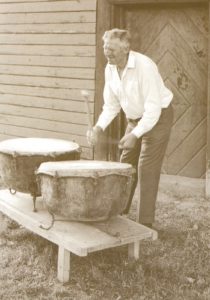
UNESCO has recognized it as an intangible cultural heritage property
For over 20 years, the Ethnic Culture Centre of Panevėžys has been researching the Easter drumming tradition throughout Lithuania. In 2020, this tradition was listed in the intangible cultural heritage property list by UNESCO.
Since the 19th century the tradition has been practiced in various parishes of Aukštaitija, the northeastern ethnic region of Lithuania. Early on Easter Sunday, one or two drummers begin drumming to awaken the local population, and symbolically, welcome spring, greet the sun, and invite the faithful to Mass.

An 1994, In the town of Vadokliai, Panevėžys Museum‘s Ethnoculture Department recorded this tradition. As the sun rose on Easter Sunday, the “Easter drum“ (a kettle-drum) was brought out of the church into the churchyard. Local parishioner Albertas Kisielis took turns drumming with others for half and hour to an hour at a time. The drumming continued as Mass began, together with the ringing of the church bells, while the Easter procession circled the church three times. Once the procession was over, the drum was put away until the next Easter. The tradition was continued with some interruptions over the years by male parishioners. The drummers say they must drum hard enough to make it buzz, without pausing and without slowing down. The rythm is quick and precise. Drummers actually compete to see who drums the longest. Easter drumming begins with slow, separate beats then increases, slowing down again at the end.
A documentary film called “Easter Drums“ (Velykų būgnai) was created by D. Snicoriūtė in 1996, showing Albertas Kisielis preparing the drum. Researchers found that Easter drumming was a tradition not only elsewhere in Aukštaitija, but in Žemaitija and Suvalkija as well. In some locations ir has been renewed after a hiatus of many years.



























